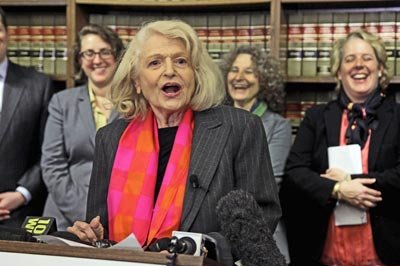A federal appeals court in New York last week became the second in the nation to declare a portion of the federal ban on same-sex marriage unconstitutional — and the first to call for anti-LGBT discrimination to warrant a higher level of judicial review.
A panel of the Second Circuit Court of Appeals last Thursday found, in a 2-1 ruling, that the Defense of Marriage Act violates the equal-protection guarantee in the Constitution.
It also asserted that laws that classify people based on sexual orientation should be considered using heightened scrutiny, a stricter type of judicial review that has previously been applied to cases involved discrimination based on sex, race and religion.
The ruling was made in the case of Edith Windsor, a Philadelphia native and New York resident who was forced to pay more than $350,000 in federal estate taxes following the death of her longtime partner, Thea Spyer.
“This law violated the fundamental American principle of fairness that we all cherish,” Windsor said in a statement last week. “I know Thea would have been so proud to see how far we have come in our fight to be treated with dignity.”
DOMA, passed in 1996, prohibits the federal government from recognizing legal same-sex marriages, and thus prevents same-sex couples from enjoying the federal inheritance tax exemption that married heterosexual couples are given.
“The federal courts keep coming to the same conclusion: Treating married same-sex couples differently than married different-sex couples is just plain unconstitutional,” said Susan Sommer, director of constitutional litigation at Lambda Legal.
Windsor, 83, who attended Temple University and later moved to New York, married Spyer in Canada in 2007, and Spyer died two years later — after New York began to recognize same-sex marriages legally performed in foreign jurisdictions, but before the state itself sanctioned marriage equality.
Windsor’s case was filed in November 2010 by the American Civil Liberties Union and its New York chapter along with law firm Paul, Weiss, Rifkind, Wharton & Garrison LLP.
This past summer, a district court judge ruled in Windsor’s case that Section 3 of DOMA, the clause that prevents the government from recognizing same-sex marriages, was unconstitutional. That ruling prompted an appeal from the Republican-led Bipartisan Legal Advisory Group of the House of Representatives — as the Obama administration has declined to continue defending in court — leading to last week’s appellate ruling.
“Yet again, a federal court has found that it is completely unfair to treat married same-sex couples as though they’re legal strangers,” James Esseks, director of the ACLU’s LGBT Project, said in a statement. “Edie and Thea were there for each other in sickness and in health like any other married couple, and it’s unfair for the government to disregard both their marriage and the life they built together and treat them like second-class citizens.”
Windsor’s attorneys previously asked the U.S. Supreme Court to bypass the Second Circuit and consider the case. Pundits expect the Supreme Court to take up at least one DOMA challenge pending before it in the coming year.
Last spring, the First Circuit Court of Appeals in Massachusetts struck down the same section of DOMA, becoming the first federal appellate court to do so — and joining a number of federal district courts that have, in the past few years, found Section 3 to be unconstitutional — although none have proffered the heightened-scrutiny assertion.
Chief Judge Dennis Jacobs, a Bush appointee, wrote in the majority opinion that gays and lesbians “have historically endured persecution and discrimination,” that homosexuality is not related to one’s ability to contribute to society, that gays and lesbians are “a discernible group with non-obvious distinguishing characteristics” and that the community remains a “politically weakened minority” — all bases for applying heightened scrutiny.
Jacobs noted that while marriage equality is a new concept, marriage is a legal, not religious, concept.
“Our straightforward legal analysis sidesteps the fair point that same-sex marriage is unknown to history and tradition,” he wrote. “But law (federal or state) is not concerned with holy matrimony. Government deals with marriage as a civil status — however fundamental — and New York has elected to extend that status to same-sex couples. A state may enforce and dissolve a couple’s marriage, but it cannot sanctify or bless it. For that, the pair must go next door.”

